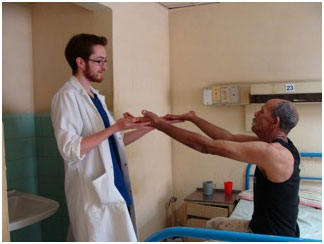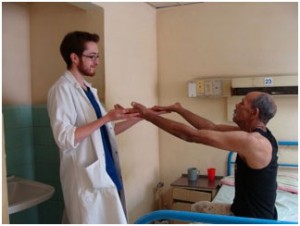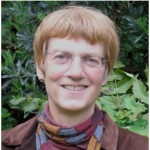26th January 2016 Havana, Cuba
What Britain’s future doctors are learning in Cuba

Health services everywhere are under pressure, so perhaps there are lessons to be learned from Cuba, where, to quote Cubans, “We are a poor people but we die of rich people’s diseases.” British medical students have an opportunity to see for themselves during their ‘elective period’ – a few weeks when they can study where and what they like.
Cuba Medical Link, a UK registered charity started six years ago by a London GP, has enabled 300 students to study in Cuba. Around two-thirds are British; the others come from 17 different countries. The charity provides personal advice and facilitates contact with the medical schools in Havana and Santiago.
No es fácil, as they say in Cuba. Foreign students are in Cuba on Cuba’s terms. They pay substantial fees for their tuition. They have to speak Spanish. They learn alongside Cuban medical students, they live with Cuban families.
Cuba is very different from home, yet many aspects of medical care are familiar, although British doctors no longer wear white coats. Students don a bata blanca and enter a world of shared knowledge of the human body and its infirmities. They may be working in buildings sadly in need of basic repairs, and doctors may have only a thin, shabby towel to dry their hands, but the commitment to patients is the same.
Elective students take their turn in examining patients and presenting their findings, and being questioned by the team. Blood tests and imaging are limited, so Cuban students learn to make a diagnosis without technology. As one British student said, “I felt like an amateur compared to their seemingly vast clinical skills!”
Some differences can be startling. To students educated in Britain, where confidentiality is a primary concern, it is a shock to find two doctors consulting in the same small room and all available space crammed with patients’ relatives and friends, nurses, medical students and even the next patient who has wandered in through the open door.
In many countries preventative health care is given only lip service, or is the responsibility of public health departments. Visiting students see how in Cuba it is everyone’s responsibility, and they make the connection with Cuba’s impressive health statistics. They may even take part: one student was proud to give a talk about reducing their risk of heart disease to a group of abuelos at their exercise class.
Health education in Cuba is partly political will, partly the directness of relationships in Cuba. A Cuban doctor can tell a patient he is ‘un poco gordo’ without offence. And in Britain GPs rarely peer into their patient’s fridge. As one student observed “The primary care doctor in Cuba is part shaman, part confessor and this demonstrates both their medical and social roles and how it is difficult, and probably inappropriate, to try to see one without the other.”

Students go to the beach, play football, go dancing with their fellow Cuban students. Cuban doctors teach them how to interpret X-rays and how to make a mojito, and they pick the students’ brains about how illnesses are currently managed in Britain.
Students find themselves a window on a different world. And not just Britain. The Indian parents of one British student came to visit. “We had a big dinner with the two families which was a mixture of Cuban, English and Indian food with a healthy amount of Cuban rum afterwards. It was a fabulously fun evening. Our hostess is fascinated by Indian culture but will probably never see the real India. I like to think in some way our visit allowed her and her family to understand a little more about other cultures as much as it helped us to do so.”
Students go home with fluent Spanish, albeit se comen las palabras, salsa skills, a taste for cuba libres, and lasting friendships. And a lot of food for thought. They see how the long term social and economical consequences of more than half a century of communist rule, el bloqueo and cultural isolation affect ordinary people’s lives. ‘No es fácil’.
As one student summed it up: “I’m very glad I took the leap, it was an incredible experience. I probably would have learnt more medicine somewhere else, but I feel strongly that the point of the elective experience is to broaden the student’s horizons, which it did with a vengeance!”

Hi there,
I really enjoyed your post! As mentioned, the site is no longer running so I wondered if you had any suggestions for organising a placement/ elective in Cuba?
Thank you in advance!
Aisling
Great post..thanks for sharing..
Really fantastic post. I enjoyed your full article. Thanks for sharing a nice post with us.
Dear Mr Cole, Dr Harvey.
Is there anyway to use a contact seeing as the site is no longer running. Myself and a group of students are very interested in doing a medical elective in Cuba.
Many thanks
Dear Mr Cole, I am a british GP from London. I am a single mother, supporting 3 little girls. I spent the past year having treatment of breast cancer in Spain and I got immersed in Cuban culture, yes more than Spanish. I would like to move to latin america and I know healthcare is all run by the government in Cuba, but my question is would I be able to live and support my children in Havana if I got a job? I speak spanish, but not perfectly, working on it. Thank you for your help.
Amal
Difficult question. I’ve never heard of any foreign doctors working in the Cuban health system but there may be some. A first step would be to check with the Cuban Embassy in London whether you are allowed to work here.
Regards
Tim
Hi Tim
I was unable to find the answer on gmc-uk.org. Cuba was not listed in the qualifications accepted, that may be accepted or those under investigation. I am currently on my final year as a medical intern in Cuba and I would like to know if the Cuban medical degree is accepted in the UK after completing the necessary exams. I am from an English speaking country. I have heard of a lot of foreign medical doctors going through so many difficulties then they don’t even get accepted regardless of remarkable grades. Thank you
Thanks for your reply. If you can’t find the answer on the GMC website, then I would recommend you contact them (http://www.gmc-uk.org/about/contactus/contact_5.asp) directly to ensure you are definitely looking in the right place and have access to the information you need. We are not able to offer definitive advice because, as you know, approved qualifications and approved medical schools offering certain eligible qualifications do change from time to time, and we would never want to offer out of date or inaccurate guidance.
However, your message indicates that Cuba does not feature on the GMC’s list of accepted qualifications. As far as we can see, there is no specific list of qualifications that are accepted, but instead the GMC states that acceptable qualifications must be in a certain class of medical degree from a list of medical schools contained in the World Directory of Medical Schools. 14 of Cuba’s medical schools do feature on that list, so I would urge you to read those entries carefully, including sponsor information, and check whether your medical school and qualification are listed. You can then use that information when you contact the GMC to check that your school and qualification are still currently acceptable. Without knowing your precise circumstances, we can’t offer any further advice, but I certainly hope this is helpful as a first step. As the body responsible for determining the acceptability of qualifications, the GMC should be your main source of guidance
Hi
I want to ask if Cuban medical degre is accepted by gmc uk after undergoing plab examination .
Thank you
Hi Layla
You can find the answer to your question here:
http://www.gmc-uk.org/doctors/registration_applications/acceptable_primary_medical_qualification.asp
Tim
hello Judith and Tim Cole – I’m trying to set up a Family Medicine program in Zimbabwe and often use Cuba as an example of success when promoting this. Also I am an old friend of Judith. Would love to talk more about this.
Sunanda Ray
Dear Mr Cole and Dr Harvey,
I am a medical student currently organising my elective, which will be in February/March 2017. I’m quite interested in going to Cuba for some paediatric or paediatric surgical experience. Please would you contact me if you have any info…
Best wishes,
Olivia Cundy
olivia.cundy@hotmail.com
Olivia
It’s great to hear you’re interested. Details are on Cuba Medical Electives website: http://www.cubamedicalelectives.org/
Best
Tim